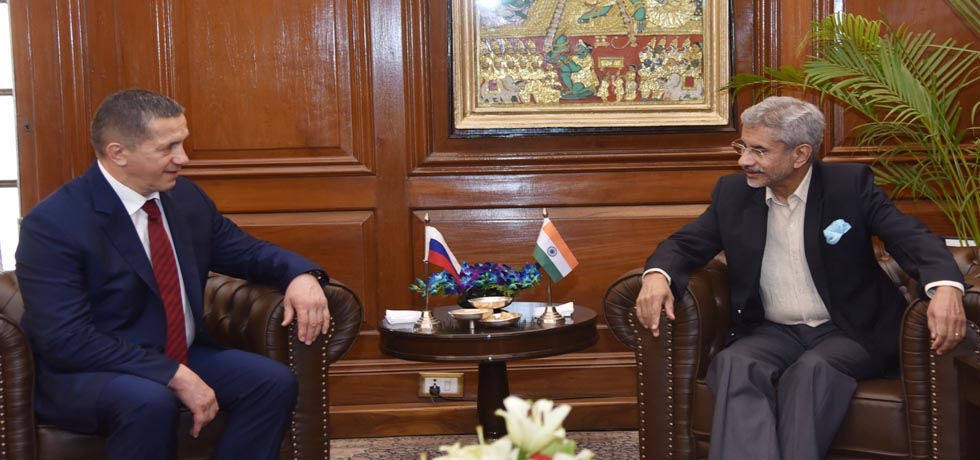As Russian Deputy Prime Minister concludes India visit, all eyes on Russian Far East
By IAR DeskRussia’s Far East is resource rich, with oil and gas and timber, but parsely populated and is interested in having Indian skilled labour develop it
Photo: Ministry of External Affairs, India

Mr. Yury Trutnev, Deputy Prime Minister of the Russian Federation and Presidential Plenipotentiary Envoy to the Far Eastern Federal District concluded his India visit today, 19 June. He had been leading a high-level delegation to India from 15 June 2019, which included, amongst others, senior officials from the Russian Ministry for Far East Development, Far East Investment and Export Agency, representatives of Russian regions, industry representatives and academia.
Among his official engagements in New Delhi, Deputy Prime Minister Trutnev held meetings with Shri Ajit Doval, National Security Advisor, Dr. S. Jaishankar, External Affairs Minister and Shri Dharmendra Pradhan, Minister of Petroleum and Natural Gas. He had an interaction with Dr. Rajiv Kumar, Vice Chairman of NITI Aayog, and also attended a round-table discussion involving representatives of leading Indian Universities to foster closer partnership between Indian and Russian Far Eastern Universities in the field of science and education.
Trutnev’s visit comes soon after Prime Minister Narendra Modi had a bilateral meeting with Russian President Vladimir Putin on the sidelines of the Shanghai Cooperation Organisation in Bishkek earlier this month. Foreign Secretary Vijay Gokhale had then described this meeting as being ‘suffused with this warmth that they enjoy as colleagues and that they have enjoyed over the past few years’. Putin had invited Modi as the Main Guest to attend the Fifthe Edition of Russia’s Eastern Economic Forum scheduled to be held in Vladivostok in Russia’s Far Eastern Region in September this year. Modi had accepted the invitation and confirmed his presence.
Trutnev’s visit to India was undertaken to help both the Indian and Russian sides to prepare the ground for the visit of Prime Minister Modi to Vladivostok as the Chief Guest of the event, a statement from the Ministry of External Affairs.
The visit also provided an opportunity for the visiting delegation to explore bilateral cooperation in the sectors of Diamond-processing, Petroleum and Natural Gas, Coal and mining, Agro-processing and Tourism which have been identified as the priority areas for development in the Russian Far East. Both sides agreed to work together to promote their bilateral economic engagement in the Russian Far East.
The Russian Deputy Prime Minister also travelled to Mumbai where he interacted with prominent Indian industry representatives and had meetings with Indian companies having business interests in the Russian Far East. The Russian state news agency TASS quoted Trutnev as saying that ‘the world should be multipolar both politically and economically’ and that India and Russia should ‘work on this together’. Calling the dominance of one currency in the world as ‘wrong’ he called on India and Russia to use the dollar ‘less’ and develop national currencies instead.
In Bishkek the Indian Foreign Secretary had described Russia’s Far Eastern region as being ‘resource rich, with oil and gas and timber’ which was also sparsely populated and the Russians were interested in having Indian skilled labour develop the region. This has emerged as a new area of cooperation in bilateral ties, and business houses from different Indian states will be visiting Vladivostok and the Russian Far East prior to the Forum.
By inviting Indians to develop the region, Russia also wants to balance the influx of Chinese migrants there, which has been a source of long standing friction with the local populace. Indian engagement in the region would allow India and Russia to draw closer and balance the Sino-Russian engagement which has grown deeper over the past few years as the US and West imposed sanctions on Russia. India has watched this growing engagement with consternation, as it also paved the way for greater Russian-Pakistani cooperation, including in defence. In its turn Russia has viewed with alarm India’s growing and close ties with the US, especially in defence. India still has to find a way out to fulfil its commitment to purchase the almost $ 5 billion dollar S400 Triumf missile system from the Russians, with the threat of American sanctions under CAATSA looming over it. Modi’s scheduled visit to the economic forum in September will help to assuage Russian anxiety regarding bilateral relations.
During Modi’s visit to Vladivostok both sides will also hold the annual bilateral summit.